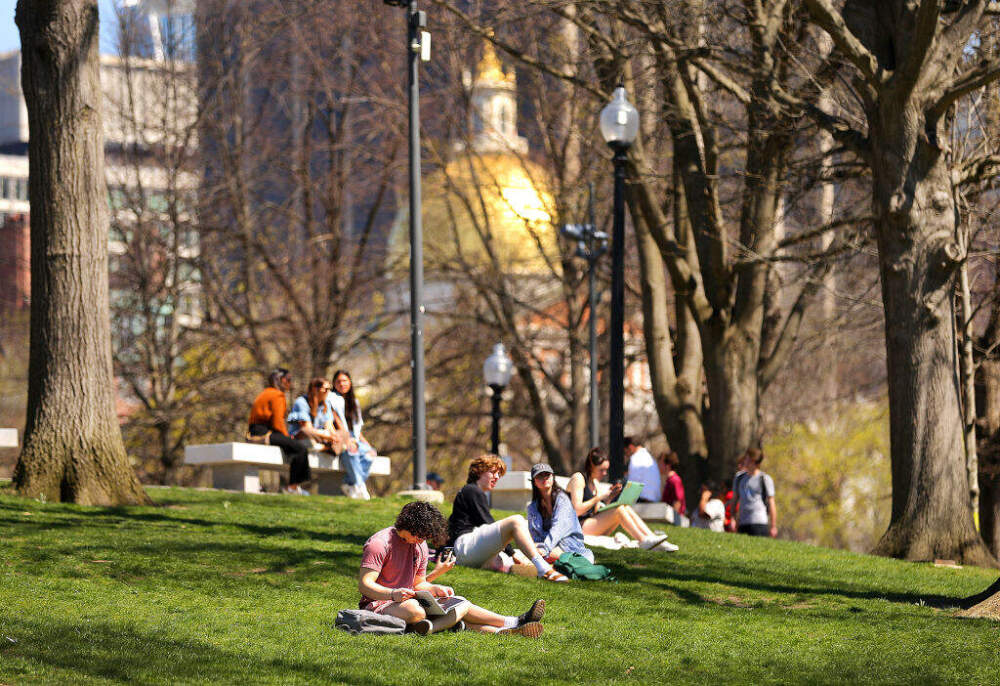Advertisement
Commentary
Boston could lose 25% of its young people. I may join the exodus

Sometimes it takes a while for the data to catch up to what we see and experience in everyday reality. And last week, a seismic poll from the Greater Boston Chamber of Commerce confirmed what many of us already knew: The Greater Boston region is on the brink of seeing an exodus of young people. About 25% of adults between the ages 20 and 30 surveyed for the poll said they expect to leave Greater Boston in the next few years.
Why? Home prices remain astronomical, promotions and raises are out of reach, and the rent is still too damn high. As a 35-year-old Boston resident whose main lifeline to the city is a landlord who has not yet raised our rent to the breaking point, I’ve lived this reality myself. Upon reading the alarmed coverage of the poll, a part of me wanted to scream, “Yes! Let’s get out of here.”
After all, in recent months I’ve found myself visiting ex-Bostonian friends who’ve found a higher quality of life in Providence and Philadelphia at a fraction of the cost. I’m 90% sure that within a year or so, I will join them. But for a lot of young Bostonians, the thrill of beginning a new chapter in a more affordable city is tempered by grief and anger. Because a city that you’ve called home isn’t just a place where you work, eat and sleep. It’s a place to which you give a part of yourself.
When I landed a job at the Boston Phoenix back in 2011, I realized that despite growing up on the suburban edge of the city, I knew practically nobody rooted in Boston. But what gave me a sense of hope and possibility in that first year was witnessing so many fellow 20-somethings committing their passions and skills to Boston despite the city’s high price tag.
The local bands that I saw at TT The Bear’s (which is now gone) and Great Scott (which is now a Taco Bell Cantina) could have gone to New York, Baltimore or any of the other cities with more exciting music scenes. But they chose to stay here in Greater Boston and keep the local scene alive. I noticed a similar civic loyalty when I began volunteering for city council campaigns. The young organizers who helmed these often successful efforts to elect city leadership more representative of Boston’s multiracial population were experienced enough to take their talent to bigger cities and national campaigns. But they decided to stay, too. They had put in the hard work that’s required of any long-lasting relationship, and they weren’t about to just walk away.
Making friends within these youthful communities and seeing new parts of the city through their eyes made me fall in love with Boston. And in 2022, over a decade after I signed my first Boston lease with equal parts excitement and financial anxiety, I channeled my own love of the city into a community project that bloomed beyond my wildest expectations. When I announced that I had found a way to walk through more than 30 Boston parks, gardens and urban forests — and that I had created maps and directions for this walk — people from multiple generations met up with me to sample the adventure. Through these unlikely urban rambles, Boston’s Walking City Trail was created. And last year, when Outside magazine cited the trail by name when commemorating the City of Boston as an urban walking destination, I thought, “Yeah. We built that.” This was our love letter to Boston.
Advertisement
So many of us have written soliloquies like this to the Greater Boston area, whether it’s through our creative work, our volunteerism or simply our vocal enthusiasm for the region. Today, as I watch manufactured housing shortages and unconscionable real estate prices push young residents beyond the I-495 belt, the grief and anger I feel isn’t just the sour grapes of a rejected lover. It’s a broader sadness for Greater Boston and what our region is in danger of losing.
When young people can’t afford to commit to a city, the metro area suffers from an austerity of ideas and energy. We’ve already seen this happen as tiers of young residents are priced out of expensive regions like the San Francisco Bay Area and New York. Service workers, artists, and other people in low-income fields are the first to disappear. But more recently, white collar workers with advanced degrees have joined the outflow. And we shouldn’t be surprised.
Why should young people stick around and contribute their ideas and energy to a place that doesn’t care if they stay or go? Imagine being a 20-something watching Milton residents reject the MBTA Communities Act, preventing any new housing from being built. Think about how it feels to be a young tenant weathering another crushing rent increase as Beacon Hill rebuffs Boston’s request for permission to experiment with rent control. Would you want to devote your time and energy to a region so indifferent to your ability to live there? When City of Boston employees are among those at risk of economic displacement, Boston’s young people don’t stand a chance.
Despite years of anxious chatter, policy roundtables, and poll after poll that reaffirms what we know about Boston’s future, young residents are still wrestling with two massive elemental questions. Can I commit to this place? Is it worth investing myself in this city? Until we can offer affirmative answers, we will continue to lose young residents. And we will be poorer for it.
